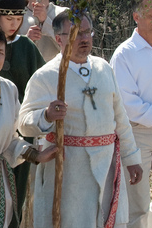Jonas Vaiškūnas
Jonas Vaiškūnas | |
|---|---|
 Vaiškūnas during a Romuva procession | |
| Born | 6 March 1961 |
| Nationality | Lithuanian |
| Occupation(s) | ethnoastronomer, physicist, museologist, publisher, politician, vaidila |
| Spouse | Daiva Vaiškūnienė |
Jonas Vaiškūnas (born 6 March 1961) is a Lithuanian ethnoastronomer, religious leader, publisher and politician. He is the head of the department of ethnography at the Museum of Molėtai and priest in the Baltic neopagan organisation Romuva.
Biography
[edit]Jonas Vaiškūnas was born on 6 March 1961 in the village Papiškė in Švenčionys District Municipality. He graduated from the physics department of Vilnius University in 1984. In the 1980s, he worked in the physics department at the Lithuanian Academy of Sciences. From 1990 to 1998, he worked as a researcher and museologist at the Lithuanian Museum of Ethnocosmology in Molėtai.[1] He is the head of the Museum of Molėtai's Ethnographical Hut and Sky Observation Post, which he created in the 1990s.[1][2] Since 2002, he is the director of the Archaeoastronomical Centre of the Lithuanian Academy of Sciences.[1]

Vaiškūna has published more than 40 scientific papers and more than 400 articles of popular science. In 2010, he co-founded the online newspaper Alkas.lt, for which he became editor-in-chief in 2011.[1] In 2012, he published a book about the Lithuanian zodiac, Skaitant dangaus ženklus (lit. 'Reading the signs of heaven').[3] This zodiac has only survived in fragmentary attestations, which Vaiškūnas used in an attempt to reconstruct it. It is closely related to the standard Western zodiac but has culture-specific elements.[4] Vaiškūnas has been interviewed in the Lithuanian media in his role as ethnoastronomer during calendar holidays and celestial phenomena.[5][6][7]
Vaiškūnas is a vaidila (priest) in the Baltic neopagan organisation Romuva.[8] He became involved in politics in 1988 when he represented the Reform Movement of Lithuania locally in Molėtai until 1991. Since 1996, he is active in the Lithuanian Nationalist and Republican Union.[1]
Personal life
[edit]Vaiškūnas is married to the mathematician Daiva Vaiškūnienė. They have three daughters, born in 1990, 1993 and 1998.[1]
References
[edit]- ^ a b c d e f "2014 m. gegužės 25 d. rinkimai į Europos Parlamentą: Jonas Vaiškūnas: Biografija" (in Lithuanian). Lietuvos Respublikos vyriausioji rinkimų komisija [The Central Electoral Commission of the Republic of Lithuania]. 2014. Retrieved 12 May 2021.
- ^ "Ethnographical Hut and Sky Observation Post". moletumuziejus.lt. Museum of Molėtai. Retrieved 12 May 2021.
- ^ "Lrytas.lt biblioteka: 838. J. Vaiškūnas. 'Skaitant dangaus ženklus'". Lietuvos rytas (in Lithuanian). 14 November 2012. Retrieved 5 April 2020.
- ^ Saukienė, Inga (24 February 2013). "Mūsų protėviai turėjo savo Zodiako ženklų sistemą". Delfi (in Lithuanian). Retrieved 5 April 2020.
- ^ Jursevičius, Deividas (23 June 2014). "Ką iš tikrųjų reiškia paparčio žiedas ir kaip jį rasti". Vilniaus diena (in Lithuanian). Retrieved 5 April 2020.
- ^ Siavris, Edita (30 December 2017). "Ką reikia suspėti padaryti iki Naujųjų?". Vakarų ekspresas (in Lithuanian). Retrieved 5 April 2020.
- ^ Jalianiauskienė, Vitalija (31 December 2017). "Vertingos dangaus pamokos". Sekundė (in Lithuanian). Retrieved 5 April 2020.
- ^ Pranskevičiūtė, Rasa (2013). "Contemporary Paganism in Lithuanian Context: Principal Beliefs and Practices of Romuva". In Aitamurto, Kaarina; Simpson, Scott (eds.). Modern Pagan and Native Faith Movements in Central and Eastern Europe. London and New York: Routledge. p. 81. ISBN 978-1-84465-662-2.
External links
[edit]- Personal website (in Lithuanian)
- 1961 births
- Living people
- 20th-century physicists
- 21st-century physicists
- Museologists
- Lithuanian astronomers
- Lithuanian publishers (people)
- Lithuanian non-fiction writers
- Lithuanian modern pagans
- Modern pagan religious leaders
- People from Švenčionys District Municipality
- 20th-century Lithuanian politicians
- 21st-century Lithuanian politicians
